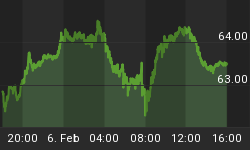I don't know whose idea it was, but someone out there is smart enough to push when no one is around to push back.
"Dow Jumps Most Since 2009 as Central Banks Take Action on Crisis." "Take action," they certainly did. But what action did they actually take? You will be hard-pressed to find very many people who can explain just what it meant when the central banks of the U.S., Canada, Europe, the U.K., Switzerland, and Japan announced a coordinated 50bp cut in the bilateral foreign exchange swap lines that connect the central banks to one another. The story linked to above summarizes the action by saying the central banks did this "[to make] it cheaper for lenders to borrow in dollars."
At best, what they did was to cut the interest rates at which banks can borrow dollars by 50bps (assuming that they are borrowing from the central banks, which is in itself a bad thing). With the last couple hundred basis points of easing not doing a lot to prevent or to stem the crisis, it is hard to imagine that 50bps here is a big deal. The real issue here is the availability of dollar funding, more than its cost. What is a big deal, the market thinks, is the fact that the central banks are coordinated - they are all singing from the same hymnal.
And what hymn are they singing?
They're singing a song of more liquidity, lower interest rates, and more liquidity on top of it. Incidentally, onto the list of easing central banks you can now also add the Chinese Central Bank, which last night reduced reserve ratios for their banks (many people think the Chinese banking system is already a mess, so reducing reserve ratios may be a way to prevent them from going bust as well as stimulating the economy). Equity investors reasonably think that this is good for them (at least, until inflation arrives), so the S&P rallied 4.3% on the day; inflation-linked bond buyers know that this is good for them, so breakevens widened 6-10bps; commodity investors suspect they too will not be left out so Industrial Metals rallied 5.3% and Gasoline jumped 1.1%.
But if it's good for everyone, why don't central bankers just do the same thing every day?
Clearly, it can't be good for everyone. Where all of today's wealth is coming from is...the future. Today's jump in prices serves to shift wealth from the future "us" to the "us" right now. (There are also other effects between individuals and groups, such as from consumers who have to pay higher prices to investors who are at least partially immunized, but the main thing is that by pushing up markets now we are assured to have lower returns going forward, assuming that the future real value of the assets don't change because more money is printed). So the central banks are robbing Peter to pay...Peter. And we are oh so excited about that!
I said yesterday that there was a glimmer of hope. I meant that. It's a glimmer of hope, not a shining beacon that we can't miss. Despite stronger-than-expected ADP figures today (+206k vs +130k expected) and higher-than-expected readings from the Chicago Purchasing Managers' report (62.6 vs 58.5 expected), this is still just a glimmer while Europe flails. To fan this spark into a flame, we need policymakers to have a steady hand and not freak out. Today's coordinated action is a small thing, but it isn't clear to me that it is in lieu of freaking out - for example, by implementing a coordina ted global QE3.
I noted earlier that today's rally just takes money from the future "us" to the "us" today. That's true, I said, if the future real fair values of the markets are not affected by this policy (if those values are indeed affected, then the central banks should just keep easing forever). But in the spirit of positive thinking I will admit to one possibility in which today's rallies represent real gains. If, by 'jump-starting' confidence, policymakers are able to change the future equilibrium level from a depressed state to a growing state, then such action really does represent gain.
However, some people would say that sounds an awful lot like "pumping up a bubble."
On Thursday, the future "us" will probably start taking their wealth back. While economic data - Initial Claims (Consensus: 390k from 393k), ISM Manufacturing (Consensus: 51.8 from 50.8), Vehicle Sales and Chain Store Sales - have room to exceed expectations, it will be too tempting for investors sitting on 7.6% gains for the week to resist taking profits. And the lack of liquidity cuts both ways. I doubt we'll plunge 4% on Thursday, but I would not be surprised to give back half of the day's gains. A slow grind higher would surely have been better...and then we might have snuck up on the "future us."















